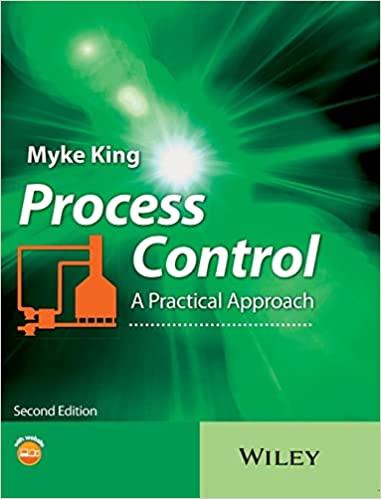Question
Potter and Baron studied the reaction CO + Cl 2 converts in COCl 2 at 1 atmosphere, using an activated carbon catalyst. Preliminary studies showed
Potter and Baron studied the reaction
CO + Cl2 converts in COCl2 at 1 atmosphere, using an activated carbon catalyst. Preliminary studies showed that the rate of reaction did not depend on the mass velocity of gases through the reactor.
Analysis of the rate data indicated that the reaction occurred by adsorption of Cl2 and CO on the catalyst and surface reaction between the adsorbed complexes. It appears that the surface reaction, rather than the adsorption or desorption steps was controlling the overall reaction rate. Furthermore, preliminary adsorption measurements indicated that chlorine and phosgene were readily adsorbed on the catalyst, while CO was not. Hence, the adsorption equilibrium constants of carbon monoxide, although it was not zero, was considered negligible with respect to those for Cl2 and COCl2.
a) On the basis of this information, develop an expression for the intrinsic rate of reaction in terms of the bulk partial pressure in the gas phase. The reaction is irreversible.
b) Determine the best values for the adsorption equilibrium constant for Cl2 and COCl2 and the product from the following experimental data, where the temperature was 30.6C, the catalyst size was 6 to 8 mesh, and = Total concentration of active sites, moles/gram of catalyst, ks = specific reaction rate constant for surface reaction and KCO = adsorption equilibrium constant for CO.
|
| |||
0.00414 | 0.406 | 0.352 | 0.226 |
0.00440 | 0.396 | 0.363 | 0.231 |
0.00241 | 0.31 | 0.320 | 0.356 |
0.00245 | 0.287 | 0.333 | 0.376 |
0.00157 | 0.253 | 0.218 | 0.522 |
0.00390 | 0.61 | 0.113 | 0.231 |
0.00200 | 0.179 | 0.608 | 0.206 |
Assume that the 6 to 8 mesh catalyst particles are small enough that the pore surface was fully effective.
Step by Step Solution
There are 3 Steps involved in it
Step: 1

Get Instant Access to Expert-Tailored Solutions
See step-by-step solutions with expert insights and AI powered tools for academic success
Step: 2

Step: 3

Ace Your Homework with AI
Get the answers you need in no time with our AI-driven, step-by-step assistance
Get Started


